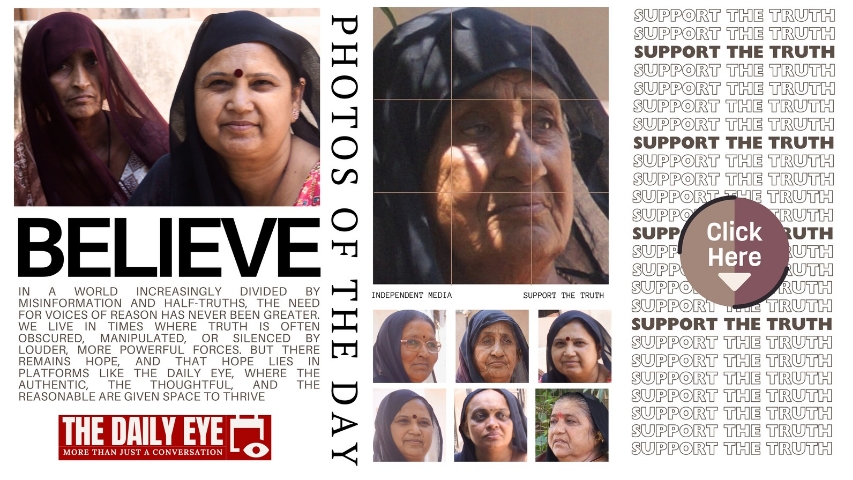
POLITICS: GLOBAL VIOLENCE AND THE HUMAN TOLL
by HUMRA QURAISHI October 5 2024, 12:00 am Estimated Reading Time: 6 mins, 44 secsAs wars and violence surge worldwide, this article explores the tragic human cost, global power dynamics, and the urgent need for peace and unity in an increasingly divided world. Humra Quraishi writes…
Photography: Vinta Nanda
In a world grappling with escalating violence, from the Middle East to Ukraine, the human toll of war, hate, and displacement continues to rise. This article sheds light on the pressing global crises, the failure of world powers to address escalating conflicts, and the devastating impact on displaced communities. Featuring insights from UN Secretary-General Antonio Guterres, Arab leaders, and renowned voices like Noam Chomsky, it emphasizes the urgent need for peace, non-violence, and unity in these turbulent times. Discover how political inaction and unchecked aggression are fuelling global unrest and human suffering.
Gandhi Jayanti and Global Concerns
On this Gandhi Jayanti, UN Secretary-General Antonio Guterres focused on Mahatma Gandhi’s enduring message of non-violence, peace, and equality. Voicing deep concern over the rising tide of violence, hate, and killings spreading across the world, he stated: “From Ukraine to Sudan, the Middle East and far beyond, war is creating a hellscape of destruction, destitution, and fear. Inequality and climate chaos are undermining the foundations of peace. And hate whipped up online is spilling over onto the streets.”
Guterres' words reflect genuine concern, as he appears both perturbed and pained by the escalation of destruction and the human suffering that follows in its wake. The killings in and around Palestine and Lebanon continue unabated, compounding the tragedies in the region. With no end in sight, hundreds of thousands are being displaced in Lebanon, fleeing towards uncertainty. Even if they manage to find refuge and shelter in Syria, the road ahead remains perilous, and survival is becoming nearly impossible.
Can This War Be Stopped?
One must ask: Can this war be halted? Can the so-called superpower, the United States, play a positive role in saving the lives of thousands, or is there only doom ahead? And what about the Arab rulers? They remain largely passive spectators to this hellish havoc. Perhaps the political rulers of the Arab nations have not heard the age-old warning: "Today, it’s you; tomorrow, it could be me or us!"
Several years ago, I asked the well-known Arab academic and diplomat, Clovis Maqsoud, why the Arab rulers remain inactive in the face of such crises. He explained: “There is a broad strategic dependence of the Arab States on the US, based on the false assumption that the US is the only power that can make Israel respond to the Palestinian issue. This dependence is flawed because Israel has flouted all international norms. Israel is the only country that has never declared its boundaries since 1967. It has not acknowledged that it’s an occupying power and has given itself the license to expand its settlements. This meant violating the UN resolution of the 4th Geneva Convention, which prohibits any occupying power from altering the boundaries of the country it occupies. At the same time, the US has chosen to make Israel its principal ally, giving Israel the license to defy the UN convention with impunity.”

Echoes from the Past: Noam Chomsky on Arms and Expansion
If I may take you back to 2001, when I had the opportunity to interview Noam Chomsky in New Delhi, he detailed some concerning insights: “The threat of terrorism is not the only abyss into which we peer. An even greater threat is posed by the expansion of the arms race. The term ‘arms race’ is inappropriate because the USA, for now, is competing alone. Its goal is to achieve ‘full spectrum dominance.’ These plans have been outlined in government documents for some years, and the projects are being actively developed. The plans for the militarization of space are disguised as ‘Ballistic Missile Défense’ (BMD), and it is well understood that BMD, even if technically feasible, must rely on satellite communications. Destroying satellites is far easier than shooting down missiles. This is one reason why the USA must seek ‘full spectrum dominance’—so overwhelming control of space that even the poor man’s weapons will not be available to an adversary. The goals of militarization of space extend far beyond. The US Space Command has been explicit about this. Clinton-era publications prominently announce the primary goal: ‘Dominating the space dimension of military operations to protect US interests and investments.’ Armies were needed ‘during the westward expansion of continental United States,’ of course, in self-defence against them!”
Arab Masses and Rising Dangers
The Arab masses are openly discussing the “rising dangers in their midst.” They speak of the “invisible army” of Americans and their allies, armies marching forward, intruding and destroying, in line with well-planned and more than well-executed policies of powerful nations. These nations are bent on expanding their influence, unleashing military might on human lives and infrastructure. Various ploys and tactics are employed—either through proxy rulers or by silencing existing leaders—to halt timely interventions from those who might have the courage to act.
During an interview I conducted with Saif El Islam, the son of former Libyan President Muammar Gaddafi, he lamented the lack of unity among Arab nations. He stated: “If I were given a chance to rule Libya, my first priority would be to unite the Arab countries. Only unity can save us from being humiliated by the Israelis and the Americans. The US, being a superpower, believes it has the right to impose embargoes, bomb, and attack other countries. The small nations that bear the brunt of this aggression have no choice but to view the US as an aggressor. This is a reality we have to live with. We are totally against Israel; we don’t even recognize it as a State!”
Destruction Without Relief
As human disasters continue to escalate, there seems to be no relief in sight. Disturbing videos and photographs of destruction may hit our souls, but they don’t seem to bother the rulers of the day.
In India, too, disturbing developments are taking place. Can the citizens of this democracy still hold long and short marches for a cause? Are non-violent, aggrieved citizens allowed to voice their concerns? Are they permitted to protest in peaceful ways? Or will they face arrests, detentions, and humiliations if they dare to march or run to present their demands to the government in New Delhi?
This question arises in the context of Leh-based activist Sonam Wangchuk, who, along with 150 concerned citizens, walked for a month from Leh to New Delhi. And what was their reward? They were detained by the police before finally being released. If this is the treatment meted out to him and his fellow activists, one can only imagine the fate of lesser-known activists who also wish to voice their concerns.
Hate Speeches Continue Unabated
Meanwhile, hate speeches and those who deliver them continue to operate unchecked, unleashing divisive rhetoric across the country. Not just from the proclaimed Hindutva brigades, but even from certain chief ministers of BJP-ruled states. There seems to be no talk of halting this behaviour. None of the communal leaders or figures spewing hatred have been banned, even though they openly make provocative communal comments.
What further troubles the common man is the news that Dera Sacha Sauda chief Gurmeet Ram Rahim Singh has once again walked out of jail on a 20-day parole. Meanwhile, individuals like Umar Khalid, who has been languishing in jail for years, see no respite. Why this disparity?
Lives Do Matter
I leave you with this: It’s time for deep introspection. As the great Lebanese poet and philosopher Khalil Gibran once said: “One day you will ask me which is more important? My life or yours? I will say mine, and you will walk away not knowing that you are my life.”






-173X130.jpg)
-173X130.jpg)
-173X130.jpg)
-173X130.jpg)
-173X130.jpg)
-173X130.jpg)

-173X130.jpg)